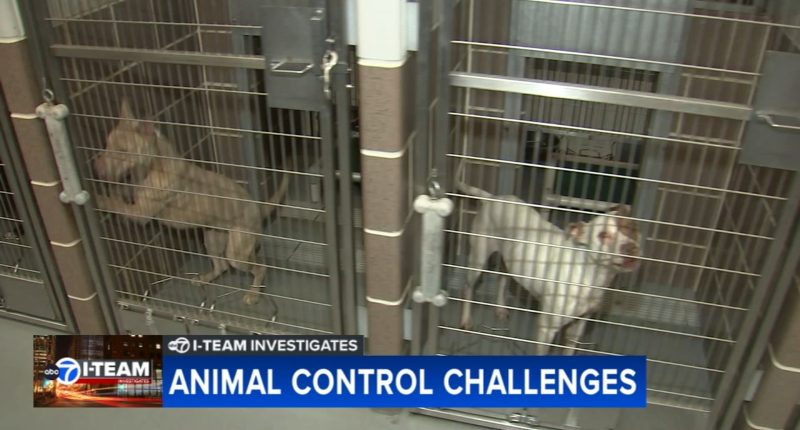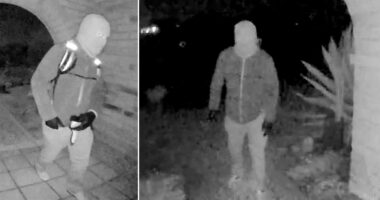Share this @internewscast.com
CHICAGO (WLS) — Recent changes at Chicago Animal Care and Control are creating chaos, according to some advocates. Sources told the ABC7 I-Team Chicago police are picking up the slack in many cases, sometimes putting officers and animals at risk.
After months of requesting an interview, the head of the department sat down with the I-Team to share the challenges of leading a big city agency for two years in the role of acting executive director.
ABC7 Chicago is now streaming 24/7. Click here to watch
Every day, long lines of people wait, clutching makeshift cages and unorthodox leashes to drop off strays or pets they can no longer care for.
“Any animal that walks into this facility, and I’ve said this publicly before, can be a candidate for euthanasia because you don’t know what’s coming in tomorrow or the next day,” said Susan Cappello, Chicago Animal Care and Control Acting Executive Director.
Cappello has been serving as acting executive director for more than two years. It’s been a challenge, she says, to make meaningful improvements as an interim leader. Budget cuts last fall are straining operations.
“We were previously open from noon to seven, seven days a week for animal intake from members of the public,” Capello told the I-Team. “We did cut those hours to be 3 p.m. to 7 p.m. Once the overtime was cut from the budget, that’s when we had to make those changes.”
Animal care officers’ daily field patrol hours now end at 7 p.m. Chicago police are stuck responding to calls when there’s nobody else.
“We’re everything to everybody. When we’re called, we’re going to show up,” Chicago Police Superintendent Larry Snelling said. “We just came up with a canine unit that’s going to help us out with animal control.”
RELATED | Dog, cats are latest victims of Chicago’s budget cuts, animal control department staffing shortage
“Just next door at the gas station, CPD came to address a lost husky. But because of manpower constraints, it was faster for a police officer to get to the scene than it was for an ACO, an animal care officer,” 15th Ward Alderman Ray Lopez said.
A Chicago police sergeant shared photos with the I-Team of three dogs trapped in a home in the Austin neighborhood on March 25, saying officers spent several hours rescuing the dogs instead of patrolling the district because they were told Animal Control officers “were done working for the day.” The sergeant said this happens regularly.
CACC has 18 field officers for animal control in the field in Chicago. Cappello said it’s not enough.
Some advocates do the rescuing themselves.
“I do rescue on the street. All over the city, mostly on the South Side,” animal rescuer Jenny Jurcak told the I-Team.
An I-Team data analysis compared Chicago to Houston, a similar sized city. CACC’s $7.2 million budget is less than half of Houston’s $16 million budget.
The shelter took in 16,813 animals in 2024, the highest number since it took in 17,000 in 2019.
The shelter euthanized more than 1,000 animals between April and June of 2024, the most since of any quarter since 2018.
“The animals that need us are those that are sick and injured out in the streets, posing a public health risk, posing a public safety risk,” Capello said.
Self-proclaimed animal lover Ald. Lopez said Capello is doing the best she can, but said “It is important for all of us to put pressure on the mayor to say, look, we need you to name a director.”
Some suggest privatizing the resource-challenged department.
“In a way, it would be a good thing,” Jurcak said.
“I think any organization could come in here and run a shelter, but… writing citations would be the part that I don’t know how that can happen,” Cappello said.
A petition circulating since 2023 asks for leadership changes and to make CACC a no-kill shelter.
“I support the idea of saving every savable animal,” Capello said. “We have animals out there that do harm, right? You can’t say don’t kill. There’s a there’s a public safety aspect to that.”
“How we treat them as a reflection of how we treat us, they are the symptom of the greater illnesses that are happening in our communities,” Ald. Lopez said.
Chicago Animal Care and Control told the I-Team “collaboration between our departments is critical” and they appreciate the dedication of responding officers, but they do “not direct or request CPD officers to intervene in animal-related incidents” after hours.
The I-Team asked Chicago Mayor Brandon Johnson’s office why a permanent CACC director has not been appointed but did not receive a response.
CACC provided an additional statement regarding help from Chicago police:
“We are excited about the formation of the Chicago Police Department’s Animal Cruelty Investigations Team and look forward to working alongside them on potential cruelty and neglect cases. Collaboration between our departments is critical to protecting animals and strengthening public safety across Chicago.
“CACC adjusted our field hours in November 2024 to better align with call volume, staffing capacity, and the needs of the city. An announcement and press release regarding this change were shared publicly on our website and social media platforms at that time.
“It is important to clarify that Chicago Animal Care and Control is not classified as an emergency services agency. Even prior to this operational adjustment, our field staff operated between 7:30 a.m. and 10:30 p.m.
“While we appreciate the dedication of responding officers, it is important to note that CACC does not direct or request Chicago Police Department officers to intervene in animal-related incidents after our hours of operation. CACC remains committed to working closely with CPD and other City partners to improve coordination and ensure animal-related concerns are addressed safely and effectively.
“CACC remains committed to the health and safety of both animals and residents. We welcome the increased attention on animal welfare in Chicago and believe stronger partnerships will lead to better outcomes for all.”
Copyright © 2025 WLS-TV. All Rights Reserved.

















